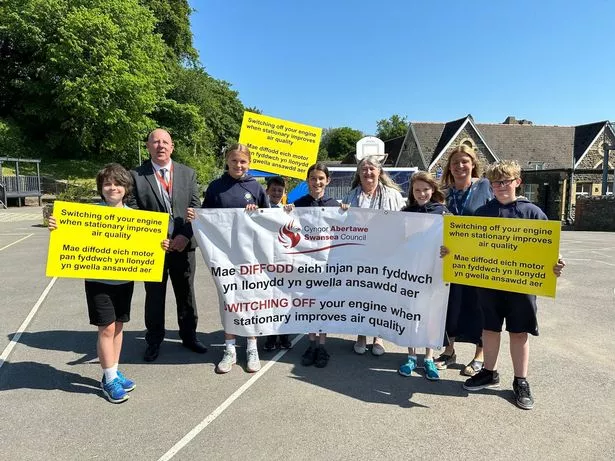SWANSEA Council’s Pollution Team has joined up with Swansea University and ThinkAir to look at the impact of vehicle-related emissions when cars and buses are idling at junctions near schools.
The scheme has been funded via the Welsh Government’s Local Air Quality Support Fund in a bid to provide cleaner air in built-up areas.
Air quality and sound monitoring units have been gathering data outside Oystermouth Primary School. Special signage has also been installed to encourage motorists to switch off their engines if they are waiting for extended periods at lights and local residents have been approached to gather survey data on their knowledge and beliefs on engine idling and air quality.
The school was chosen as an ideal site for the pilot project due to its proximity to a busy road and nearby traffic controls.
Julie James MS, Minister for Climate Change, visited the school as part of Clean Air Day which takes place on Thursday 15 June.
Julie James said: “We all need to do what we can to ensure our children, and everyone in Wales, breathes clean air.
“Through our Local Air Quality Management Support Fund, we are supporting local authorities to undertake a variety of projects to tackle pollution and support health and wellbeing. We look forward to seeing the results of the collaborative idling project at Oystermouth Primary School in Swansea, and what impact this has had on air quality around the school.”
David Hopkins, Cabinet Member for Corporate Services and Performance in Swansea Council, said: “Air pollution and improving air quality should be everyone’s concern. The scheme we have been working on at Oystermouth has relied on the participation of motorists to do the right thing and not have their vehicles idling for extended periods. This happens at schools all around the city as well as elsewhere in the country.
“We are in the process of studying the data collected during the monitoring process – to see if signage we had in place has encouraged motorists to get on board, and as a result, improve air quality. If that is the case, it maybe, that we look at rolling out a similar scheme of including advisory signs near other schools.
Cllr Hopkins added: “A pilot study was carried out in Sketty in July 2022 and which showed that motorists are prepared to do their bit and show consideration for their local environment. We are in an age now where many modern vehicles have equipment fitted which automatically switch off engines when they are at a stop. The signage illustrated that other motorists switched off and air quality improved.”
Dr Menna Price, from Swansea University’s School of Psychology, said: “Our previous research has shown that behaviour change messaging is a simple and effective way to encourage drivers to stop idling when stationary in traffic and improve air quality. This is particularly the case when messages are aimed at overcoming identified barriers to switching car engines off.
“Primary schools situated by busy roads are particularly important to target with this sort of intervention given their proximity to idling traffic. As a result, we are currently researching the beliefs and behaviours around engine idling in drivers near Oystermouth Primary school and the effects of this type of messaging on air quality outside the school.”


















